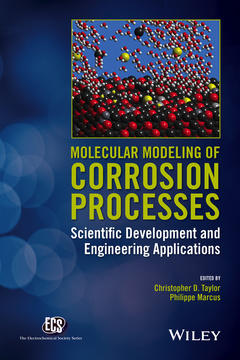Description
Molecular Modeling of Corrosion Processes
Scientific Development and Engineering Applications
The ECS Series of Texts and Monographs Series
Coordinators: Taylor Christopher D., Marcus Philippe
Language: English
Subject for Molecular Modeling of Corrosion Processes:
272 p. · 16.4x24.1 cm · Hardback
Description
/li>Contents
/li>Biography
/li>
Presents opportunities for making significant improvements in preventing harmful effects that can be caused by corrosion
- Describes concepts of molecular modeling in the context of materials corrosion
- Includes recent examples of applications of molecular modeling to corrosion phenomena throughout the text
- Details how molecular modeling can give insights into the multitude of interconnected and complex processes that comprise the corrosion of metals
- Covered applications include diffusion and electron transfer at metal/electrolyte interfaces, Monte Carlo simulations of corrosion, corrosion inhibition, interrogating surface chemistry, and properties of passive films
- Presents current challenges and likely developments in this field for the future
List of Contributors vii
Foreword ix
Preface xi
1 An Introduction to Corrosion Mechanisms and Models 1
Christopher D. Taylor, Julian D. Gale, Hans-Henning Strehblow and Philippe Marcus
2 Molecular Modeling of Structure and Reactivity at the Metal/Environment Interface 35
Christopher D. Taylor
3 Processes at Metal–Solution Interfaces: Modeling and Simulation 65
Noelia B. Luque, Wolfgang Schmickler, Elizabeth Santos and Paola Quaino
4 Atomistic Monte-Carlo Simulations of Dissolution 99
Steve Policastro
5 Adsorption of Organic Inhibitor Molecules on Metal and Oxidized Surfaces studied by Atomistic Theoretical Methods 125
Dominique Costa and Philippe Marcus
6 Thermodynamics of Passive Film Formation from First Principles 157
Michael F. Francis and Edward F. Holby
7 Passive Film Formation and Localized Corrosion 191
Vincent Maurice, Alexis Markovits, Christian Minot and Philippe Marcus
8 Multiscale Modeling of Hydrogen Embrittlement 223
Xu Zhang and Gang Lu
Index 251
Philippe Marcus is Director of Research at CNRS (Centre National de la Recherche Scientifique) and Head of the Research Group of Physical Chemistry of Surfaces at Ecole Nationale Supérieure de Chimie de Paris, France. Pr Marcus received his Ph.D. (1979) in Physical Sciences from University Pierre and Marie Curie, Paris, France. He is the author of over 400 papers in the field of surface chemistry, surface electrochemistry and corrosion science, and two books on Corrosion Mechanisms in Theory and Practice, and Analytical Methods in Corrosion Science and Engineering. He is Past President of the European Federation of Corrosion, Fellow of the Electrochemical Society and the International Society of Electrochemistry. He received several international Awards, including the Uhlig Award from the Electrochemical Society Corrosion Division, the Whitney Award from NACE, and the U. R. Evans Award from the Institute of Corrosion.

